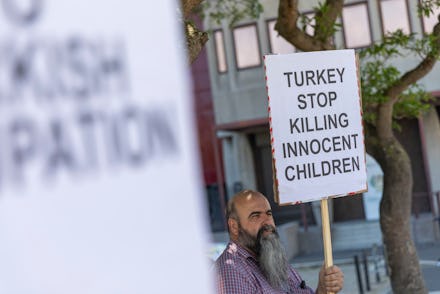The U.S. abandoning the Kurds isn't surprising. We've done it for decades

Last week, President Trump announced that he was pulling U.S. troops from northern Syria, paving the way for Turkey to invade Kurdish territories there. Immediately, Turkish troops moved in, bombing Kurdish positions with jets and artillery. Thousands of civilians have been killed and 130,000 Kurds have reportedly been turned into refugees. Once again, the U.S. has abandoned the Kurds.
What makes this particularly galling is that the Kurds have long been staunch U.S. allies. They have helped us fight and imprison ISIS; 11,000 fighters from the jihadist group have been held in Kurdish-run prisons in northern Syria, where the Kurds have played an instrumental role in keeping the terrorists from regaining their foothold.
Now, those prisons are in jeopardy. Reports indicate that scores of ISIS prisoners have escaped, even as Trump claims that Turkish President Recep Tayyip Erdogan will continue managing the prisons. Considering Trump also claimed that Erdogan wouldn’t attack the Kurds shortly before he did exactly that, it’s hard to take any promises Trump makes about the autocratic Turkish president seriously. And in the meantime, Kurds are dying.
“It’s a dagger to the heart to walk away from people who shed blood for us,” said a former CIA official in an interview with the The Washington Post. A retired general called Trump’s retreat a “morally indefensible act.” One soldier on the ground in the region told CNN that "it's pretty messed up what's happening out here." Another said: “They did everything we asked them to do. This is really not good for us."
Crucially, one U.S. defense official lamented: "How do we expect anyone to partner with us now?"
Perhaps a better question is, considering this country’s decades-long history of abandoning the Kurds when it’s politically convenient, why should we have expected anyone to partner with us in the first place? As Jon Schwarz wrote in The Intercept, “Nothing in this world is certain except death, taxes, and America betraying the Kurds.”
The U.S.’s history of Kurdish abandonment traces back to 1974, when then-Secretary of State Henry Kissinger first sent $1 million in aid and a cache of weapons to the Iraqi Kurds, who were at the time engaged in a struggle for an independent Kurdistan against the Iraqi dictator Saddam Hussein. A cable that Kissinger sent to the U.S. ambassador in Tehran at the time hints at the Kurds’ eventual betrayal. It laid out three guiding points for the aid: “(a) to give Kurds capacity to maintain a reasonable base for negotiating recognition of rights by Baghdad government; (b) to keep present Iraqi government tied down, but (c) not to divide Iraq permanently because an independent Kurdish area would not be economically viable and U.S. and Iran have no interest in closing door on good relations with Iraq under moderate leadership.”
In other words, Kissinger wanted the Kurds to have enough military force to fight Hussein when it was convenient — but not enough to actually establish a successful country of their own. After all, the U.S.’s ultimate strategic goal in Iraq was regime change, and an independent Kurdistan would have gotten in the way of that mission. So when, in 1975, America stood by as Hussein attacked the Kurds and razed 1,400 villages, it was hardly surprising.
At the time, the Kurds weren’t enough of a foreign policy priority for the U.S. to really protect them. That outlook continued into the next decade: The U.S. knew that Hussein was using nerve gas on the Kurds in the ‘80s, but it didn’t want to disrupt his regime’s attacks on Iran. Thus, the Reagan administration refused to implement sanctions, and the Kurdish genocide once again took a back seat to other policy concerns in the region.
In 1991, when Hussein’s Iraq invaded Kuwait, President George H.W. Bush encouraged the Kurds to fight back. The elder Bush asked “the Iraqi military and Iraqi people to take matters into their own hands, to force Saddam Hussein, the dictator, to step aside.” But when they did so, and Hussein inevitably slaughtered them in return, the U.S. did nothing.
Eventually, the first Bush administration designated northern Iraq a no-fly-zone to offer the Kurds protection from Hussein’s bombers. The Kurds meanwhile established the autonomous Kurdistan Regional Government, which served as a vital ally during the war in Iraq. But during the Clinton presidency, only the Iraqi Kurds were given U.S. sympathy and protection. According to The Intercept, the Kurds in Turkey a few miles away were being massacred by Turkey using weapons bought from the United States. In 2007, President George W. Bush stood by while Turkish bombs again rained down on Kurds, this time in Iraq.
Still, the Kurds offered their assistance to America, and their forces have proved instrumental in the fight against ISIS in Syria. They fought back against the caliphate and captured thousands of ISIS fighters — even as President Barack Obama refused to invade Syria in full force, essentially appointing the Kurds as U.S. proxies in the region. In return, the Kurds expected protection. But that was never something the U.S. made any real long-term commitment to, which makes Trump’s callous abandonment — and thoughtless assertion that if ISIS prisoners do escape, “they’ll escape to Europe” — as unsurprising as it is disturbing.
Repeatedly, Kurds have fought and died for U.S. interests. And repeatedly, they’ve been abandoned as soon as America’s leaders decide they have bigger fish to fry. In this latest instance, the only difference is the baffling justifications offered by an erratic president. It may be alarming that Trump has thrown the Kurds to Erdogan’s mercy because “they didn’t help us with Normandy,” but in truth, the U.S. has never respected Kurdish bloodshed. That’s unlikely to change — especially not when there’s money to be made at the Trump Towers Istanbul.